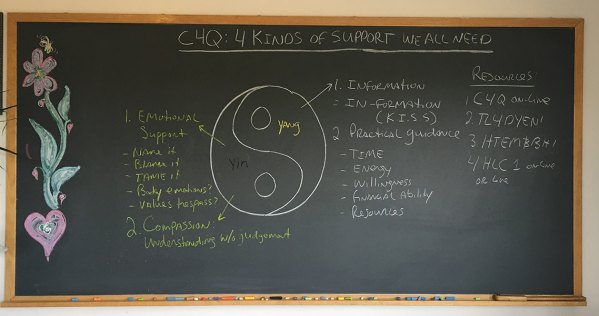4 Kinds of Support We All Need – Part 1 of 2
Welcome to my blog for this week. This is part 1 of a two-part series where I’ll be talking about the four types of support we all need when we are being guided or coached by others. This is also extremely relevant even if you are not a coach or someone who helps other people make changes in their lives, as we all work through challenges or strive to achieve goals at some point.
I like to divide these four kinds of support into two categories:
Yin or feminine aspects
- Emotional Support
- Compassion
Yang or masculine aspects
- Information
- Practical Guidance
We’ll cover the Yin aspects in part 2 next week, so today we start with the Yang aspects.
Information
We are in a very information-dense era right now when we are constantly bombarded by the media everywhere we go. Information is immediately available thanks to the internet and mobile devices, but this tends to lead to “paralysis by analysis.” There is so much information available that we end up not being able to choose or do anything.
What does “information” mean? Information, at its root, relates to any pattern we can recognize or make sense of, that we can keep “in formation.” If we cannot understand the information that is coming at us, it creates chaos inside of us and that diminishes our levels of energy and vitality and decreases the likelihood we will make positive changes.
In effect, it produces a stress response, which is a problem especially when the person is already overloaded with stress from other sources, such as financial stress, relationship stress, work-related stress and etc.
When you are sharing information, be very conscious of how much information the person can handle and what is the most relevant to help her/him meet their most immediate needs or overcome the most pressing challenges confronting them.
Angeles Arrien found through her research that the need to know was one of the root causes of addiction. There is a tendency nowadays to look at so much information without actually bringing it into our lives and practicing it, creating what I call smart, dumb people who look and sound like they know what they are talking about but can’t seem to get anything done.
So whenever you need to dispense advice or information, follow the acronym KISS = Keep It Simple Stupid!
Practical Guidance
If we get too caught up in our heads, what sounds good to the person giving the advice may not be practical for the person receiving it. Whenever you are designing any kind of program, be it exercise, stretching, lifestyle, stress management, nutrition or the like, there are five key factors that must be considered:
- Time
- Energy
- Willingness
- Financial Ability
- Resources
In the video below, I review each of these factors and show you how to consider them when giving practical advice.
Resources
- This topic comes from my CHEK 4 Quadrant Coaching Program. Part 1 is now available online and you can find out more about this program by clicking here.
- How to Eat, Move and Be Healthy!
- The Last 4 Doctors You’ll Ever Need
- The Center for Non-Violent Communication
- Angeles Arrien’s website
- Mind-Body Medicine: The New Science of Optimal Health by Professor Jason Satterfield, available from The Great Courses.
I hope you enjoy watching my vlog and I look forward to seeing you next week for part 2 on the Yin or feminine aspects,
Love and chi,
Paul















Find me on the web